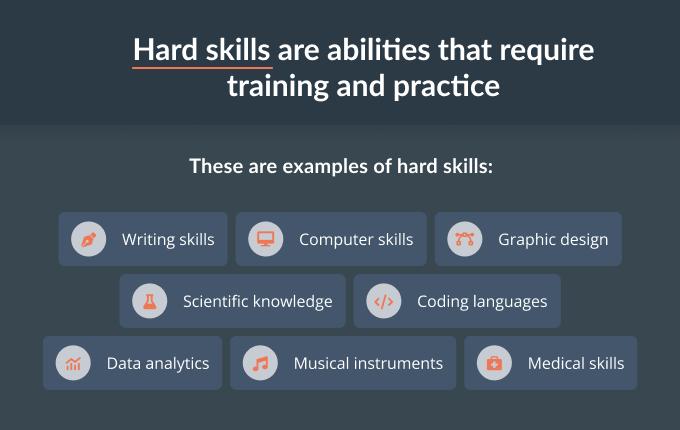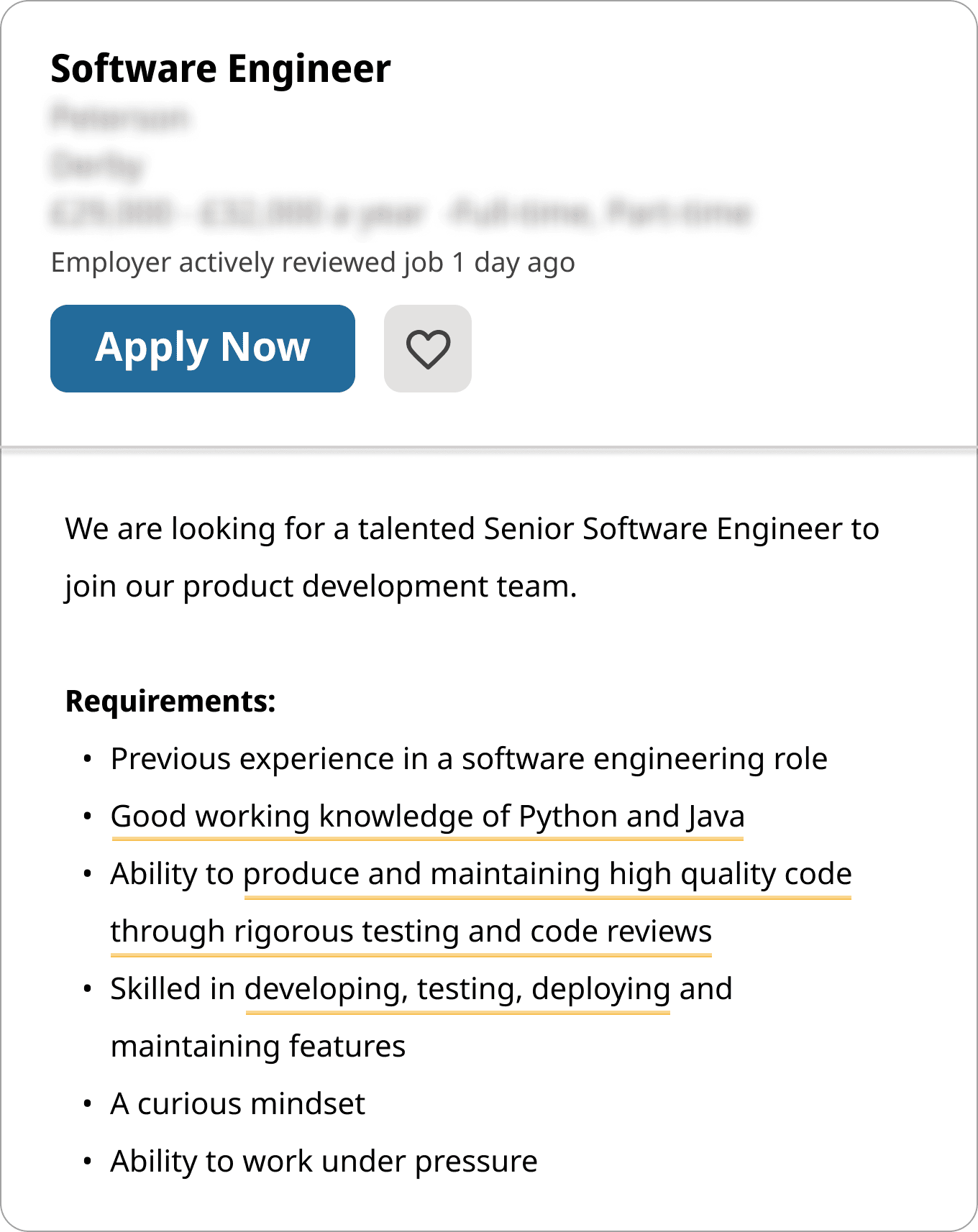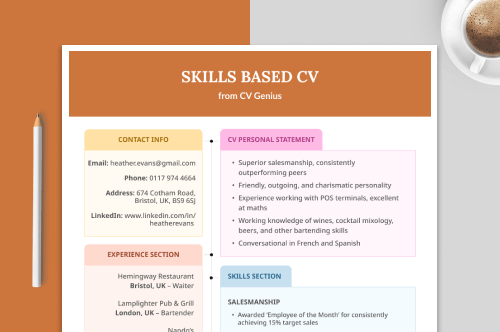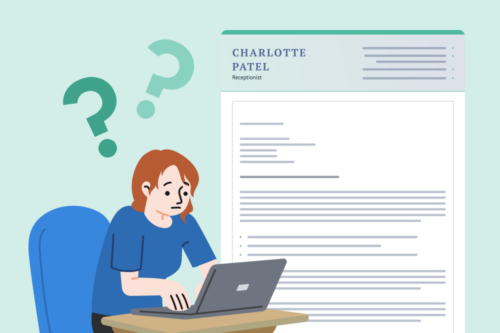No matter what job you’re going for, you’ll need to demonstrate the right hard skills on your CV to get hired. But what even are hard skills and how can they help you advance your career?
Allow us to clear up that confusion with a hard skills definition and some examples of hard skills that will help you advance professionally in 2024.
What are hard skills?

Hard skills are technical knowledge or abilities that you learn through specific training. Some examples include driving, speaking a second language, and operating a till. Hard skills differ from soft skills, which are personal traits that help you work well in a role.
For an in-depth explanation of hard skills, check out this video:
Examples of hard skills employers want to see in 2024
Developing in-demand hard skills will help you find the best jobs and fast-track your career.
To give you an idea of what hard skills employers are looking for in your industry, we’ve listed the most sought-after examples for each of the following industries.
Click on any of the 10 job categories or types of hard skills below to view the examples that will impress hiring managers:
- Administration
- Business and finance
- Computing and tech
- Creative and media
- Healthcare
- Engineering
- Manufacturing
- Retail
- Science and research
- Travel and tourism
1. Administration hard skills
Though soft skills like time management remain essential to administrative work, digital skills are becoming increasingly important too. In fact, CIPD research suggests that by 2030, digital skills will be key to a successful HR career.
The following hard skills will make you stand out if you’re pursuing a career in admin:
- Virtual meeting platforms (Zoom, Microsoft Teams)
- Data entry and analysis (Excel or Google Sheets)
- Project management software (Asana, Monday)
- Collaboration tools (Slack, Trello)
- Basic understanding of cybersecurity practices (e.g., two-factor authentication)
2. Business and finance hard skills
Accountants, investment managers, and other business and finance professionals need a range of decision making and analytical skills to make sense of their rapidly changing industries. The rising importance of tech skills and sustainability in business and finance makes these extremely valuable areas to specialise in that can help you accelerate your professional development.
Developing the following hard skills will make your business or finance CV really stand out:
- Green, sustainable, and responsible finance (Sustainability and Climate Risk)
- Wealth management tools (Morningstar Direct or Personal Capital)
- Big data & data analysis (e.g., Python for analysing financial data)
- FinTech skills (e.g., familiarity with digital payment technologies)
- Blockchain and cryptocurrency skills
- Bookkeeping software (QuickBooks, FreeAgent, and Xero)
3. Computing and tech hard skills
The tech sector is one of the fastest-growing parts of the British economy, with 2.1 million jobs created in 2018 alone. However, it’s also suffering from a worsening talent shortage, meaning that digital hard skills can be a valuable addition to your CV in any industry.
Here are some of the most important emerging hard skills in computing and tech:
- Programming languages (Python, JavaScript, and Swift)
- Cloud computing services (AWS, Google Cloud Platform)
- Cybersecurity measures (firewalls, penetration testing)
- Machine learning and artificial intelligence
- Network and information security
- Mobile and web development frameworks (Express.js, Django)
4. Creative and media hard skills
Experts are predicting strong growth for the UK’s entertainment and media industry, with increasing career opportunities for creatives who invest in relevant technical skills.
In addition to core skills, such as storytelling, specialised writing, and material knowledge, UK employers are looking for creative professionals with the following hard skills on their CVs:
- Digital content creation (Adobe Creative Suite)
- Video editing and production (Final Cut Pro, Adobe Premiere)
- Graphic design and web design (e.g., UX/UI principles)
- Social media management and analytics tools (Loomly, Hootsuite)
- SEO and SEM strategies
- Photography and videography techniques
5. Healthcare hard skills
Given the UK’s ongoing shortage of healthcare workers, a wide range of medical jobs are in high demand nationwide. Many of the hard skills healthcare employers look for are developed as part of your training.
However, a growing need for digital literacy and certain core healthcare skills means that the following hard skills can significantly boost your CV’s appeal to employers:
- Clinical skills (patient assessment, clinical diagnosis)
- Medical coding and billing software (AthenaHealth)
- Electronic Health Records (EHR) systems
- Telehealth software (Cliniko)
- Up-to-date knowledge of healthcare regulations (e.g., transition from European Union CE marking to UKCA mark)
- Pharmaceutical expertise
6. Engineering hard skills
Data from the Institution of Engineering and Technology suggests a high demand for engineering skills in the UK due to a shortfall of around 173,000 qualified workers.
Sustainable practices and advances in technology are motivating demand growth behind some of the most popular engineering hard skills. Knowledge in the following areas will look great on any engineering CV:
- CAD and CAM software proficiency (SolidWorks)
- Project management tools (Microsoft Project)
- Updated knowledge of manufacturing processes (Lean Engineering)
- Sustainable design and energy efficiency
- Robotics and automation (e.g., familiarity with ROS or Cobots)
- Material science
- Understanding of IOT and smart infrastructure
7. Manufacturing hard skills
According to Make UK, over a third of manufacturing vacancies (36%) are hard to fill because of skills shortages. Growing demand in the electronics and mechanical equipment sectors is supporting an increased need for manufacturing professionals with knowledge of tech-oriented hard skills such as robotics knowledge and 3D printing.
These manufacturing hard skills are particularly likely to capture employer interest:
- Operational knowledge of manufacturing machinery and tools
- Lean manufacturing principles
- Quality control and safety standards
- Supply chain management software
- 3D printing and CAD design
- Robotics and PLC programming
8. Retail hard skills
The UK’s retail sector is huge, accounting for 5% of total economic output at the start of 2023 and supporting 2.7 million jobs.
While customer service skills remain key to most retail jobs, a shift towards online shopping and contactless payments has increased the value of relevant hard skills, such as those listed below:
- E-commerce platforms (Shopify, Adobe Commerce)
- Customer Relationship Management (CRM) systems
- Inventory management software (Sortly)
- Digital marketing and social media
- Visual merchandising
- Data analysis for sales trends
9. Science and research hard skills
The UK’s science and research sectors are poised to grow rapidly over the next few years, increasing the need for professionals with essential relevant hard skills. Given government plans to turn the UK into a research superpower by 2030, the following hard skills will look very attractive on science and research CVs:
- Statistical analysis and software (R, SPSS)
- Laboratory techniques and safety protocols
- Scientific writing and grant writing
- Data visualisation tools
- Research methodology and ethics
- Biotechnology techniques
10. Travel and tourism hard skills
Travel to the UK has made a significant recovery post-pandemic, with 3 million visits to the UK in December 2022 alone. As the number of inbound travellers increases, there’s a renewed focus on sustainability and digital customer service, supporting demand for professionals who can blend traditional hospitality skills with new technology. In particular, these skills make for a strong tourism CV:
- Booking and reservation systems (Amadeus, Sabre)
- Customer service skills
- Sustainable travel practices
- Digital marketing and social media for tourism
- Language skills
- Cultural awareness and sensitivity
3 ways to highlight your hard skills for employers
Providing specific, measurable examples of your hard skills will help you convince the employer that you can do the job well. Here are three ways to highlight your skills at different stages of the application process.
1. Emphasise your hard skills on your CV
When you’re listing your hard skills on your CV, prioritise the ones the employer is looking for.
Start by checking the job advert to see what the employer is specifically looking for. For example, the hard skills requested in this job advert are underlined in green:

Recruiters go through CVs quickly, so add your hard skills to all of your CV sections to make sure they’re noticed. Add your hard skills to your CV’s:
Or if you’re not sure what skills to include for your specific situation, using an online CV builder is an easy fix.
Builders let you:
- pick your favourite design
- select from pre-written hard skills customised to the job you’re looking for
- automatically format and optimise your CV layout
2. Promote your hard skills in your cover letter
Including key hard skills on your cover letter will allow you to outline their value to the employer and explain why you’d be a great candidate for the job in question.
Choose a couple of skills that relate closely to the job you’re applying for and prepare specific examples showing how you’ve applied them in previous jobs. One or two examples is plenty — you don’t want your cover letter to be too long.
For example, if you want to highlight your knowledge of JavaScript, you could mention a specific project you executed using that language and then highlight the positive results the project achieved.
This approach works best if you emphasise hard skills that closely relate to the employer’s needs, so consider what knowledge they are asking for before you start describing your skills in detail. A well-aligned cover letter will show an intimate understanding of the job, inspiring confidence in the employer.
If writing a strong skills-focused cover letter seems like a challenge, consider using a cover letter builder as a workaround. The best builders put together a personalised application letter using the professional information that you provide.
3. Demonstrate them in the job interview
Interview questions like ‘Tell me about yourself‘ and ‘What are your biggest strengths?‘ are great opportunities to emphasise your top hard skills to employers.
Prepare a few detailed examples of how you’ve used key skills in previous roles. Relating these examples in the job interview will show the employer that you have practical experience backing up the contents of your CV.
For truly persuasive answers, use a storytelling approach, like the STAR method, that explains the specific actions you took and the benefits that those actions delivered to your previous employer.
Here’s an example answer to ‘What’s your biggest strength?’ that applies this formula effectively:
One of the biggest strengths I could bring to this role is my advanced knowledge of JavaScript, which I can leverage to deliver notable improvements to customer-facing applications like your own. In my last position, I used JavaScript to optimise backend code and implement better data caching strategies. In doing so, I managed to reduce the load time by 50%, significantly enhancing user satisfaction.
Frequently asked questions about hard skills
Here are answers to some more of the most common questions about hard skills:
1. What are hard skills everyone should have?
Here are hard skills everyone should have:
- Computer skills
- Internet research
- Digital communication
- Device setup and maintenance
- Familiarity with AI technology (ChatGPT, communicating with AI customer service)
The hard skills listed above are essential to living and working in the UK. For instance, no matter what job you work in, you should be able to operate a computer and find basic information on the internet.
2. Which hard skill is best for the future?
Any skill related to AI is best for the future. With the launch of practical AI applications like ChatGPT, more and more jobs are being impacted by automation.
If you’re looking to future-proof your skill set, learn all you can about AI — such as what prompts to use, how to code AI programs, and how to work with AI hardware.
3. How do you improve your hard skills?
To improve your hard skills, start by identifying the skills you want to enhance and set clear, achievable goals for each.
Then, sign up for online courses and workshops, and practise consistently. You can gain hands-on experience with real projects and seek feedback from your workmates or friends to find areas for improvement.
In addition, it’s important to stay updated with industry developments (you can even follow a relevant work-related subreddit — examples include the UK policing subreddit, teaching subreddit, and Tesco subreddit), network with people in the same job, and tackle challenging tasks to refine your skills further.
4. What hard skills do I have?
The easiest hard skills to identify are the ones you hold qualifications for. For example, if you’re a mental health nurse, you may be Dialectical Behaviour Therapy–qualified. So that’s a hard skill you can list on your CV.
Also think about any software or tools you use every day. For example, you might use a till if you’re a retail assistant, so you can list ‘point of sales systems’ on your CV. If you use QuickBooks frequently as an office manager, that’s something else you can add to your CV.
Quora questions about hard skills
Here are answers to three Quora questions about hard skills.
1. What are the best hard skills for any aspiring entrepreneur?
If you’re looking to develop the best hard skills as an aspiring entrepreneur, you’ll need to develop various strengths.
First and foremost, any entrepreneur needs the core hard skills for handling business administration, including:
- management skills
- budgeting and financial management
- sales skills
- marketing skills
One of the fastest ways to develop these skills is to complete a formal course, such as a BSc (Hons) Business Management or an MBA. However, it’s also important to have thorough knowledge of the specific niche and market you want to target. Proper planning and professional development are essential if you want to make it as a business owner.
2. What is more important for a programmer, hard skills or soft skills?
Hard skills are arguably the most important skills for programmers because a programmer can’t handle the basic responsibilities of their work without the right technical knowledge. That said, soft skills are also extremely valuable.
Programming jobs are increasingly collaborative, as programmers often have to work together with team members in other departments and, at times, customers as well. Soft skills such as communication and interpersonal skills help programmers deliver better results by enabling them to relate key information to stakeholders from less technical backgrounds.
Therefore, while you should always be sure to emphasise the right hard skills on your programmer or software developer CV, be sure to include some specific examples of your relevant soft skills to show employers that you’re a well-rounded candidate.
3. What are some jobs that don’t require hard skills?
There aren’t any jobs that don’t require any hard skills. Hard skills are the learned abilities that you need to do a specific job.
However, some jobs are not very technical, making it possible to apply with little-to-no previous training or experience.
For example, some entry-level care worker jobs opportunities don’t ask for any technical knowledge or previous experience because training is provided as part of the onboarding process. In such cases, employers often look for applicants with the right mindset, soft skills, and willingness to learn, as these qualities make an applicant more likely to grow quickly and succeed if hired.




